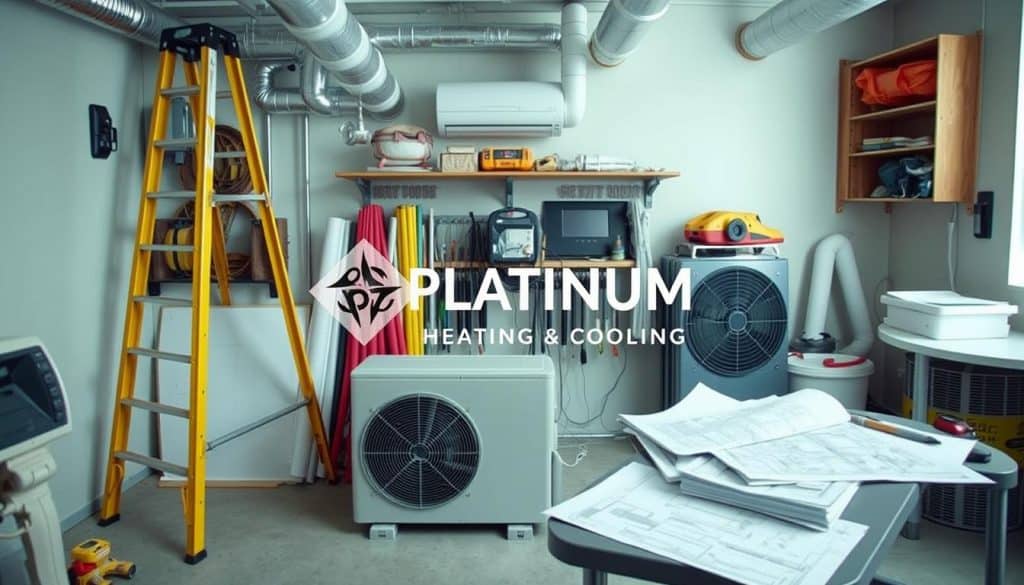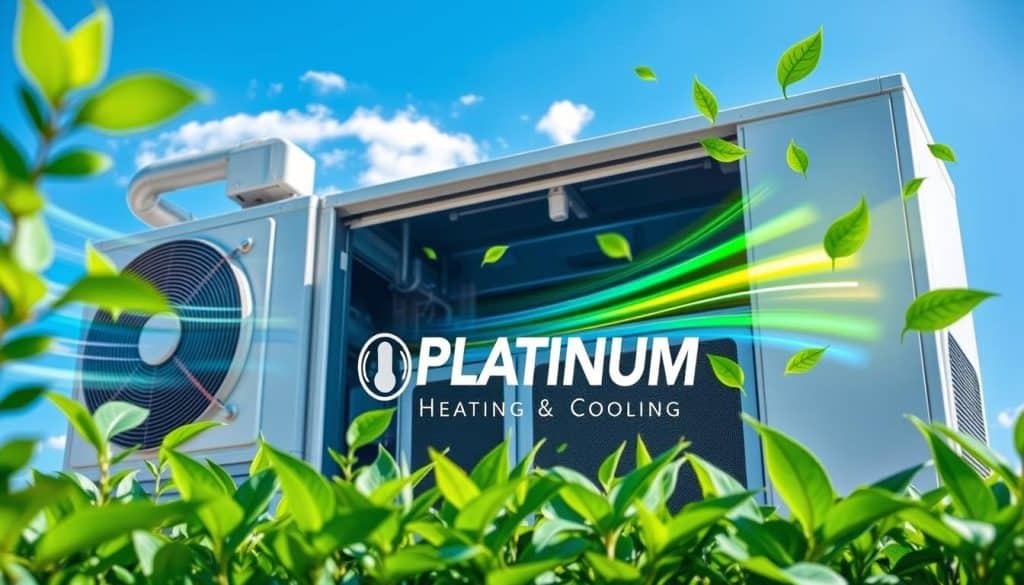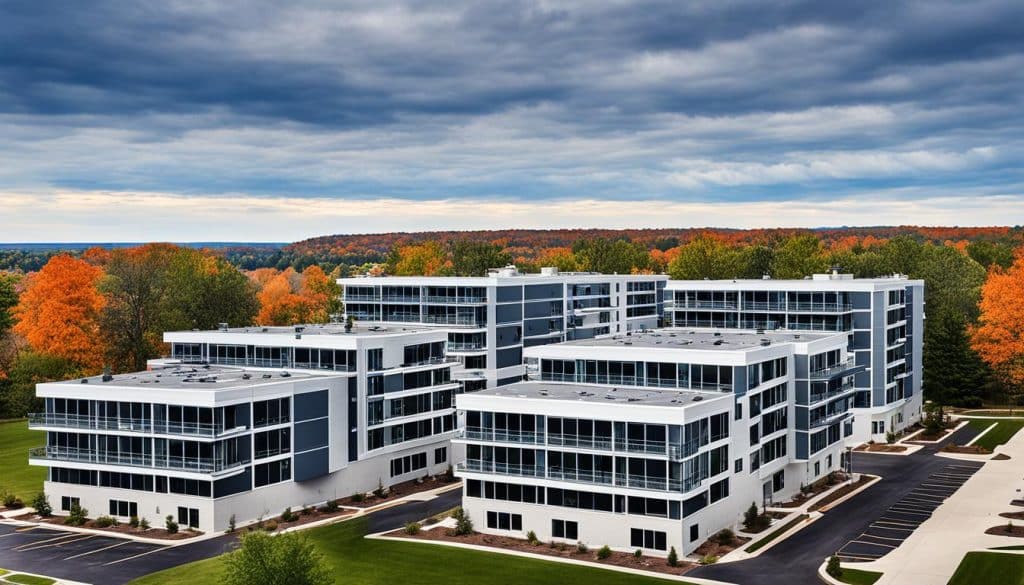Table of Contents
Are you sure your commercial air conditioning unit meets your business’s needs? How To Choose The Right Commercial AC System?
Choosing a commercial HVAC system is more complex than picking one for your home. Brands like Mitsubishi, Trane, McQuay, Carrier, and Daikin offer a range of options. It’s crucial to consider the type, capacity, and how it’s installed for efficient climate control.
From small boutiques to large offices, there’s a system for every space. Each one is designed to fit specific needs. This variety ensures you find the perfect match for your business.
Warehouses might need extra cooling solutions like ceiling fans or industrial box fans. Regular maintenance, like changing filters and using programmable thermostats, also helps. It keeps your system running efficiently and saves on costs.
Key Takeaways
- Commercial HVAC systems must be selected based on type, capacity, and specific cooling needs.
- Renowned brands like Mitsubishi, Trane, McQuay, Carrier, and Daikin offer high-quality options.
- Different commercial spaces require varied solutions—from centralized systems to ductless mini splits.
- Warehouse settings might need additional localized cooling solutions.
- Regular maintenance, including filter changes and thermostat management, enhances energy efficiency.
Types of Commercial AC Systems
Choosing the right commercial AC system is key. There are many options, each suited for different needs and buildings. It’s important for businesses to know their choices before investing.
Ducted Split Systems
Ducted split systems are great for distributing air through ductwork. They’re perfect for buildings with existing ducts, offering a cost-effective cooling solution. Regular maintenance can improve their efficiency and lifespan.
Ductless Mini Splits
Ductless mini splits are ideal for older buildings or those without ducts. They allow for customized temperature control in different areas. This makes them flexible and popular in various commercial settings.
Water-Cooled Systems
Water-cooled AC systems are great for buildings with water-cooling bases. They use water to cool, keeping large areas at the right temperature. They’re efficient and reliable, needing regular maintenance for best performance.
Variable Refrigerant Flow (VRF)
VRF systems can heat and cool different zones at once. They’re energy-efficient, making them a cost-effective choice. These systems adjust to changing needs, improving efficiency.
Rooftop Units (RTU)
Rooftop units combine heating and cooling in one package. They’re perfect for single-story buildings, saving space and simplifying installation. Regular maintenance ensures they last longer and work better.
Capacity Considerations
Getting a commercial HVAC system right starts with the right size. The right size means the system can cool the space well without wasting energy. It’s all about looking at the space and how it’s used.
Calculating Cooling Requirements
Figuring out how much cooling a space needs is key. An expert will look at the space’s size, how many floors it has, and what it’s used for. They’ll use this info to find out exactly how much cooling is needed.
Factors That Influence Capacity Needs
Many things affect how much cooling a commercial HVAC system needs. Things like how busy the building is, the amount of electronics, insulation, how many people are there, and how much sunlight it gets. Getting it right means the system works well and doesn’t waste energy.
Distribution Methods for Commercial AC Systems
The way commercial AC systems work depends a lot on how they are set up. Good ductwork design and where air handlers are placed are key. They help keep the air cool and the temperature right in different parts of a building.
Ductwork Design
Good ductwork design is very important for AC systems that use ducts. The design and materials of the ducts affect how well the system works. Ducts that are the right size and have few bends help air flow better.
Checking and fixing the duct system regularly is also important. It helps make sure the AC system works well and keeps the air cool everywhere.
Placement of Air Handlers
Where air handlers are placed is very important for both ducted and ductless systems. For ducted systems, placing air handlers right helps air flow evenly. In ductless systems, placing them correctly cools specific areas well.
Getting the placement right helps avoid hot spots. It makes sure the whole area stays cool and comfortable.
Importance of Installation Quality
The quality of HVAC system installation is key to its performance and life span. A well-installed system runs smoothly, saving energy and avoiding breakdowns.
Choosing Qualified Installers
It’s crucial to pick the right HVAC installers to avoid problems later. Companies like Platinum Heating & Cooling, at (616) 229-0444 or office@platinumheatingmi.com, have the skills to do it right. They use certified pros to ensure your system works perfectly from the start.
Common Installation Errors
Errors in HVAC installation can hurt performance and shorten its life. Mistakes like wrong equipment size, bad refrigerant levels, and leaky ducts are common. These issues can make your system less efficient, raise energy costs, and cause it to fail early.
Builders and managers should choose trusted HVAC contractors to avoid these problems. This way, they can be sure their systems work well and last long.
Maintenance and Longevity of Commercial HVAC Systems
Keeping commercial HVAC systems running well depends on good maintenance. Regular checks and fixes can make them last longer and work better.
Routine Maintenance Practices
Keeping HVAC systems in top shape is crucial. This means changing filters, cleaning coils, and checking moving parts often. These steps help avoid sudden failures and boost system efficiency.
Preventative Measures
Preventing problems is key to avoiding costly repairs. Joining HVAC Maintenance Membership Programs helps catch issues early. Using energy-saving tools like programmable thermostats also helps systems last longer.
Importance of Regular Inspections
Regular checks by experts are essential. They catch small problems before they get big. This keeps systems running smoothly and saves energy.
Following these steps helps businesses get the most from their HVAC systems. It also protects their investment.
Energy Efficiency and Cost Considerations
Energy efficiency in HVAC systems is key for commercial spaces. It helps cut down on costs and environmental harm. By using advanced energy-saving features, businesses can greatly improve their HVAC performance.
Energy-Saving Features
Today’s HVAC systems come with many energy-saving features. High-efficiency filters, automated controls, and energy recovery ventilators help cut down energy use. These features lead to better performance and sustainability.
Cost Benefits of Efficient Systems
Choosing cost-saving HVAC systems brings big financial wins. These systems use less energy, which means lower utility bills. Over time, this leads to big savings, making it a smart investment.
These systems also help reduce greenhouse gas emissions. This aligns with environmental goals.
Common HVAC Energy Efficiency Certifications
Knowing about HVAC energy efficiency certifications is important. Certifications like ENERGY STAR help find energy-efficient products. They guide business owners to choose options that are good for the planet and the wallet.
How to Choose the Right Commercial AC System?
Choosing the right commercial AC system is key for businesses. It keeps employees and customers comfortable. First, understand your cooling needs. Consider your space size, number of people, and local weather.
Energy efficiency is important. Modern AC systems save energy and cut costs. Think about the upfront cost versus long-term savings.
Quality installation is crucial. Working with experts ensures your AC works well and lasts long. Bad installation can cause problems and waste energy.
Regular maintenance is vital. A good maintenance plan catches issues early. This saves money and extends your system’s life.
Look at the AC brand and model. Brands like Carrier, Trane, and Lennox are known for quality. They offer strong warranties and support. Researching different models helps find the best fit for your business.
Conclusion
Choosing the right commercial AC system is a detailed process. It involves understanding different types, like Ducted Split Systems and Rooftop Units (RTUs). You also need to figure out the right size for your space.
The design and placement of ductwork and air handlers are key. They affect how air moves in your commercial space. Getting them installed right by experts can avoid problems and keep your system running smoothly.
Regular maintenance is also crucial. It helps your AC system last longer and work better. This reduces the chance of sudden failures and expensive fixes.
Energy efficiency is a big deal in today’s HVAC systems. They come with features and certifications that save money over time. By looking at these energy-saving aspects, you can find a system that fits your budget and values.
In the end, the right commercial AC system does more than just cool your space. It makes your business or organization a healthier and more productive place.



